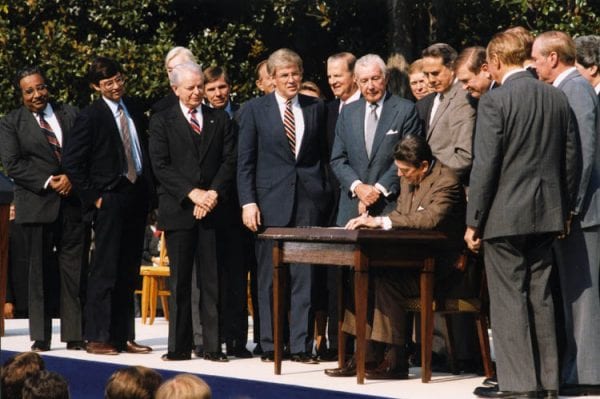
Happy Anniversary! The Tax Reform Act of 1986 Turns 27, Underscoring the Need for Another Overhaul of the US Tax Code
Taxpayers Protection Alliance
October 21, 2013

US President Ronald Reagan signs the Tax Reform Act of 1986
Last week taxpayers saw some of the worst of what happens when elected officials in Washington come together and make bad deals out of bad situations, harming taxpayers as opposed to providing solutions. October 22nd, 2013 is the 27th anniversary of the Tax Reform Act of 1986 and there is no better time to discuss this landmark legislation and how the current class of lawmakers can learn from the example of tax reform set nearly three decades ago.
The Tax Reform Act of 1986 was the last comprehensive restructuring of the tax code in United States history. Among the noteworthy accomplishments of the 1986 reform was that Democratic House Speaker Tip O’Neil, and a Republican President, Ronald Reagan, negotiated the bill. The bipartisan act did several things to alter the tax code, including:
- Lowering the top tax rate from 50% to 28%
- Broadened the base by altering several deductions
- Tackled fraud by enacting stricter rules for claiming independents
This was a major piece of legislation and it was moved in a bipartisan manner and it benefitted taxpayers, businesses, and consumers alike. The accomplishments underscores the need that we are in need of another effort to reform the tax structure here in the United States and there is no better time to start than now.
House Ways and Means Committee Chairman Dave Camp (R-MI) and Senate Finance Committee Chairman Max Baucus (D-MT) understand this need and have been working in a bi-partisan manner to push hard for a comprehensive overhaul of the tax code, including a nationwide tour listening to folks about how to change the tax system.
The most important aspect of getting comprehensive tax reform right begins with lowering the corporate tax rate. With a high corporate tax rate (the highest of any OECD country), businesses are hesitant to do business in the United States, often times looking overseas to countries that have a lower corporate tax rate to set up their headquarters.
Lowering the corporate tax rate an area where there is broad agreement on both sides of the aisle and the positive economic impact from such a restructuring could not be clearer. In a study earlier this year from Ernst & Young commissioned by the RATE coalition, their findings revealed exactly why the economy is in dire need of corporate tax reform:
- The average statutory foreign corporate tax rate of the 19 countries analyzed will have fallen nearly 35 percent between 1988 and 2015, when all currently scheduled changes will be fully in effect.
- U.S. GDP is estimated to be between 1.2 percent and 2.0 percent smaller in 2013 because of the high U.S. corporate tax rate relative to the reductions in corporate tax rates enacted abroad beginning in 1988.
- In the long run, the U.S. economy, as measured by GDP, is estimated to be smaller by between 1.5 percent and 2.6 percent if the current differences in corporate tax rates remain.
- In today’s $15.7 trillion economy, the long run impact on the U.S. economy is equivalent to a reduction in U.S. GDP of about $235 billion to $345 billion each year.
- In 2013 real wages will be about 0.1 percent to 0.3 percent lower than they would have been otherwise.
- In the long run, real wages would be about 1.0 percent to 1.2 percent lower than they would have been otherwise.
Last week, TPA sent a letter to Congressional leaders urging them to come to the table and move quickly on comprehensive tax reform:
“Everyday that Congress delays, more companies could look for a way to escape the stifling U.S. corporate tax climate. The government is losing key sources of revenue as companies flee overseas. Make no mistake: those companies won’t come back unless given the right incentives. Additionally, as new companies are founded, entrepreneurs will have no motivation to incorporate their businesses in the United States. Over time, the sun will set on this country as the world’s capital for business and innovation. All of these problems are avoidable through common sense changes in the tax code, like reduction of the corporate tax rate, which will go a long way towards alleviating these issues.”
There are many lessons to be learned from the example set by the Tax Reform Act of 1986 and as we mark another year since its passage, both Democrats and Republicans who are looking for policies to boost the economy and benefit the taxpayer. Congress would be wise to move on comprehensive tax reform that lowers the corporate tax rate to ensure that we can prevent more companies moving away from the U.S., and keep businesses who want to be successful on our shores.
